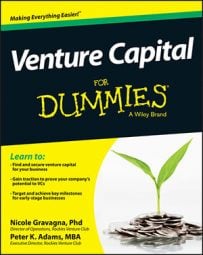It’s very important to figure out the type of company you’re building — a venture company or a lifestyle business — so that you can decide whether you should consider venture capital in your business growth strategies. Sometimes, determining which category you fall into is hard. Even though lifestyle businesses can make annual revenues into the millions, other things, like the type of business and/or the rate of growth, make them unsuitable for venture capital investment. The rate of growth and the ultimate size of the company are good indicators that can help you decide.
| Characteristics of Venture Companies | Characteristics of Lifestyle Businesses | |
|---|---|---|
| Area in which you do business | National or global | Local or regional |
| Growth rate | Very fast (you plan to grow from a brand new company into a nationwide corporation in only a few years) | Slow (you plan to open only one new location of your business each year, for example) |
| Nature of business | Generally game changing businesses based on new technologies | Businesses that sell or deliver traditional or conventional products or services |
| Makes money for | Investors, founders, and owners | Founders and owners |
| Future plans | To be sold to another company or to go public, with founders leaving the business or assuming different roles, based on need and qualifications | To be kept in the family for generations or to be sold when the founder/owner retires |

